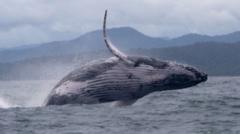An extraordinary journey by a humpback whale has captured the attention of scientists, who report that the whale has undertaken one of the longest migrations on record, potentially associated with climate change. Originally spotted off the Pacific coast of Colombia in 2017, the whale was later sighted near Zanzibar in the Indian Ocean in 2022, a staggering distance of approximately 13,000 km.
Researchers, including Ekaterina Kalashnikova from the Tanzania Cetaceans Program, describe the journey as "truly impressive and unusual" for a species already known for its long migrations. Humpbacks typically travel from warmer breeding grounds to cooler feeding areas, yet this male's journey involved two vastly distant breeding locations.
One prevailing hypothesis suggests that changing climate conditions may be affecting the availability of krill, a fundamental food source for humpback whales. As food supplies dwindle, whales might be compelled to venture further afield. In contrast, some experts propose that such migrations could indicate a search for new breeding grounds, prompted by rising whale populations resulting from global conservation initiatives.
Kalashnikova noted the potential influences behind this phenomenon, which could include the altering climate, increasing extreme environmental events, and inherent evolutionary responses of the species.
The male whale was part of a group recorded by researchers in 2013, and further sightings occurred in both 2017 and 2022. The remarkable 13,046 km great-circle distance, the minimum route the whale may have taken, does not account for the longer arc actually traveled, as Earth's curvature affects migration trajectories.
The findings of this research are founded on a citizen science database, happywhale.com, which employs artificial intelligence to compare images submitted by researchers and the public that document various humpback whale tail shapes. The study has been published in the journal Royal Society Open Science, adding to the growing body of knowledge regarding these magnificent creatures and their remarkable travels in our changing oceans.





















